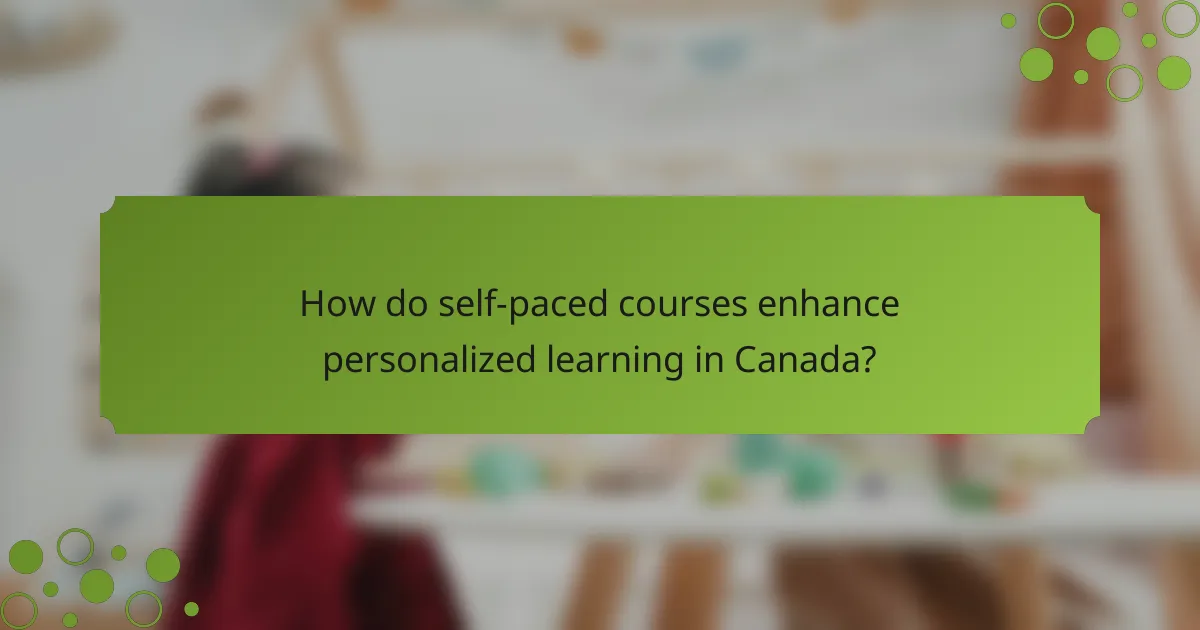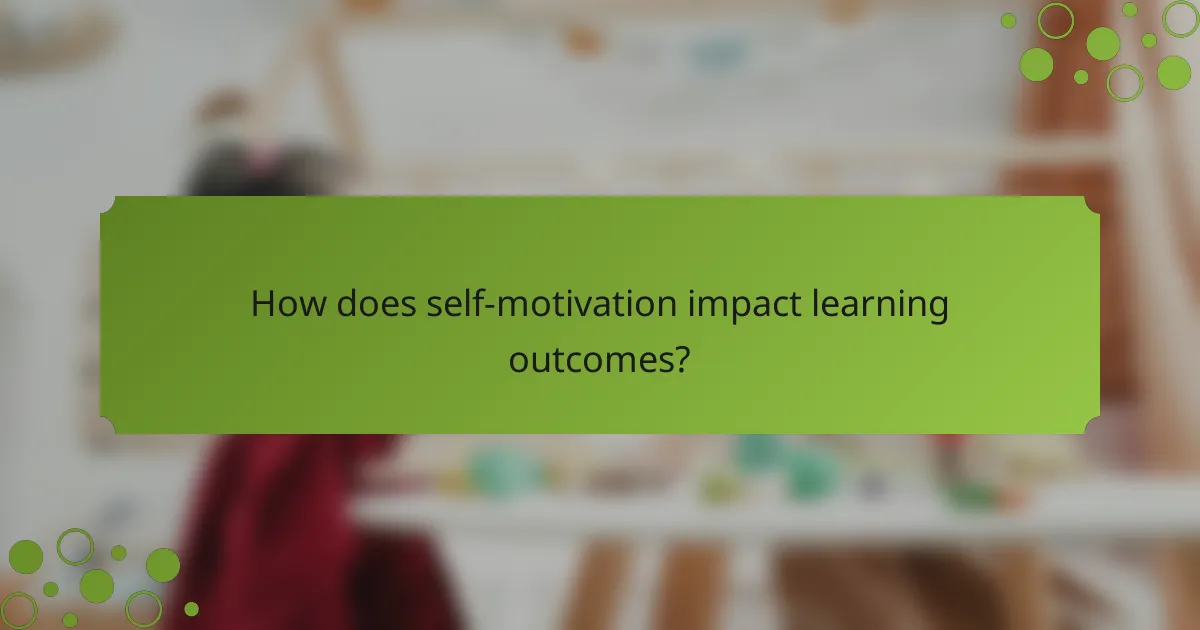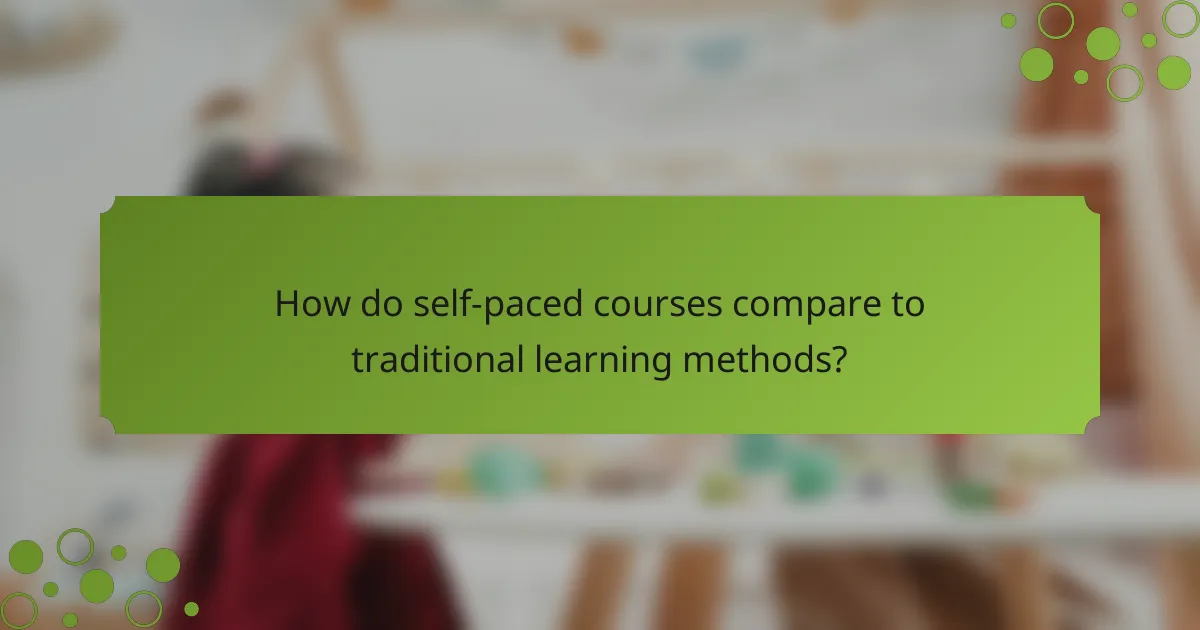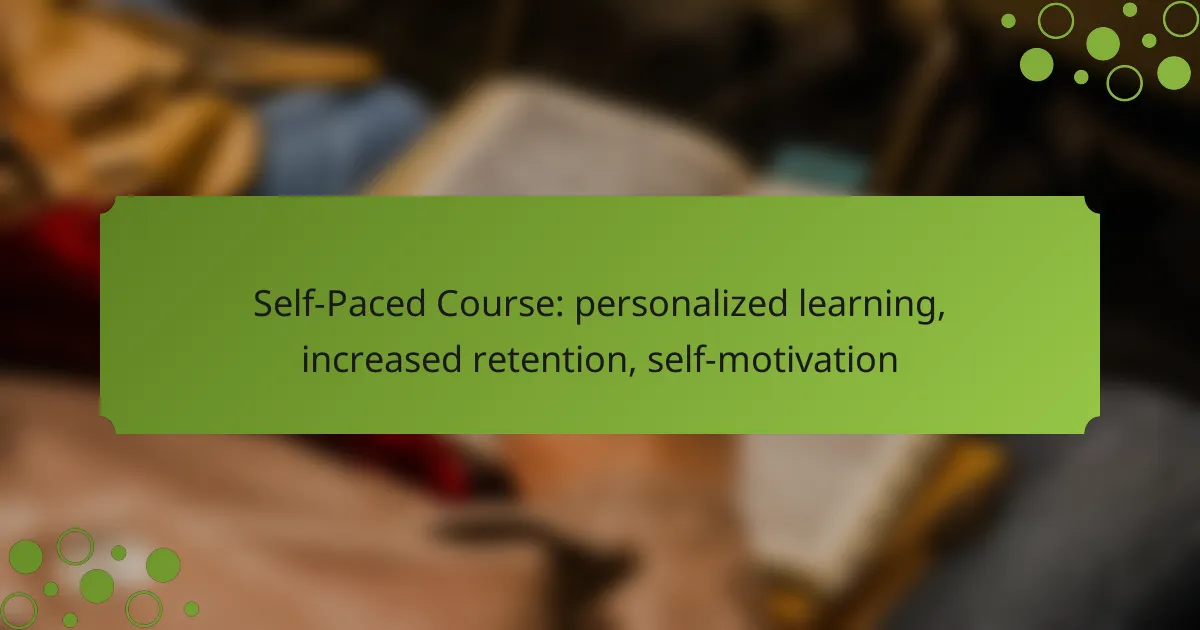Self-paced courses offer a unique opportunity for personalized learning, allowing students to progress at their own pace and tailor their educational experience to meet individual needs. This approach not only enhances knowledge retention but also fosters self-motivation, as learners can dedicate time to areas requiring more focus or challenge themselves in subjects they excel in.

How do self-paced courses enhance personalized learning in Canada?
Self-paced courses significantly enhance personalized learning in Canada by allowing learners to progress at their own speed, tailoring the educational experience to their individual needs. This flexibility fosters greater retention of knowledge and boosts self-motivation, as students can focus on areas where they need more time or challenge themselves in subjects they excel in.
Tailored learning paths
Tailored learning paths enable students to choose their own educational journey based on their interests and prior knowledge. In Canada, this could mean selecting specific modules or topics that align with personal or career goals, allowing for a more relevant and engaging learning experience.
For example, a student interested in digital marketing can focus on courses related to social media strategies while skipping over general business topics. This customization helps maintain motivation and relevance, leading to better outcomes.
Adaptive content delivery
Adaptive content delivery adjusts the learning materials based on the learner’s progress and performance. In a self-paced course, if a student struggles with a particular concept, the system can provide additional resources or alternative explanations to reinforce understanding.
This method not only caters to different learning styles but also ensures that students are not left behind. For instance, if a learner excels in mathematics but finds statistics challenging, the course can adapt by offering more practice problems and interactive content specifically in statistics.
Individualized feedback mechanisms
Individualized feedback mechanisms are crucial for self-paced learning, as they provide students with insights into their performance and areas for improvement. In Canada, many online platforms offer automated quizzes and assignments that give immediate feedback, allowing learners to adjust their study strategies accordingly.
For effective learning, students should seek courses that offer detailed feedback, such as personalized comments on assignments or progress tracking dashboards. This feedback loop encourages self-reflection and helps maintain motivation, as learners can see their growth over time.

What are the benefits of increased retention in self-paced courses?
Increased retention in self-paced courses leads to better learning outcomes and deeper understanding of the material. When learners can recall information effectively, they are more likely to apply their knowledge and feel confident in their skills.
Long-term knowledge retention
Long-term knowledge retention ensures that learners can remember and utilize information over extended periods. This is particularly important in self-paced courses, where learners may revisit material weeks or months after initial exposure. Techniques such as spaced repetition and active recall can significantly enhance retention rates.
For example, learners might review key concepts periodically rather than cramming, which can lead to a more durable understanding of the subject matter. Incorporating quizzes and self-assessments can also reinforce memory retention.
Improved application of skills
Improved application of skills occurs when learners can effectively use what they have retained in real-world situations. This practical application is crucial in self-paced learning, as it bridges the gap between theory and practice. When learners retain knowledge, they are better equipped to tackle challenges and solve problems.
For instance, a student who retains programming concepts from a self-paced course can apply those skills in a job setting, leading to more effective performance. Regular practice and real-life scenarios can further enhance this skill application.
Enhanced learner confidence
Enhanced learner confidence is a direct benefit of increased retention, as individuals feel more capable when they can recall and apply their knowledge. This confidence can motivate learners to tackle more complex topics and engage more deeply with the material. Self-paced courses often allow learners to progress at their own speed, which can further boost their self-assurance.
To build confidence, learners should celebrate small victories, such as completing modules or mastering difficult concepts. Engaging with peer communities or forums can also provide support and encouragement, reinforcing their belief in their abilities.

How does self-motivation impact learning outcomes?
Self-motivation significantly enhances learning outcomes by fostering a proactive approach to education. When learners are motivated, they tend to engage more deeply with the material, leading to better retention and understanding.
Increased engagement levels
Self-motivated learners often exhibit higher engagement levels, as they take initiative in their learning process. This can manifest through active participation in discussions, seeking additional resources, and exploring topics beyond the curriculum.
For instance, a student motivated to understand a subject may spend extra hours researching related articles or engaging in online forums, which reinforces their learning and comprehension.
Higher completion rates
Motivation plays a crucial role in improving course completion rates. Learners who are self-driven are more likely to persist through challenges and finish their courses, as they have a personal stake in their success.
Research suggests that self-motivated individuals can achieve completion rates that are significantly higher than those who rely solely on external encouragement. This is particularly evident in online courses, where self-discipline is essential.
Development of self-directed learning skills
Self-motivation encourages the development of self-directed learning skills, which are vital for lifelong education. Learners become adept at setting their own goals, managing their time, and evaluating their progress.
For example, a self-motivated learner might create a study schedule that aligns with their personal goals, allowing them to track their progress and adjust their strategies as needed. This skill set not only benefits academic pursuits but also translates to professional development and personal growth.

What criteria should be considered when choosing a self-paced course?
When selecting a self-paced course, consider factors such as the relevance of the course content, the qualifications of the instructor, and the usability of the platform. These criteria will help ensure that the learning experience is effective and aligns with your personal goals.
Course content relevance
The relevance of course content is crucial for maintaining engagement and ensuring that the material meets your learning objectives. Look for courses that align with your interests or career goals, and check if the syllabus covers current trends and practices in the field.
Additionally, consider the depth and breadth of the content. A well-structured course should offer a mix of foundational knowledge and advanced topics, allowing you to progress at your own pace. Reading reviews or testimonials can provide insights into how well the content resonates with previous learners.
Instructor qualifications
Instructor qualifications play a significant role in the quality of a self-paced course. Verify the instructor’s background, including their educational credentials and professional experience in the subject area. An instructor with practical experience can provide valuable insights and real-world applications of the material.
Furthermore, consider the instructor’s teaching style and availability for questions. Some platforms allow you to preview instructor videos or read their bios, which can help you gauge their effectiveness in delivering the course content.
Platform usability
The usability of the learning platform is essential for a smooth learning experience. Evaluate the interface for ease of navigation, accessibility of materials, and the availability of features such as progress tracking and discussion forums. A user-friendly platform can significantly enhance your motivation and retention of information.
Additionally, check if the platform is compatible with various devices, allowing you to learn on-the-go. Look for courses that offer mobile access or downloadable resources, which can provide flexibility in your learning schedule.

How do self-paced courses compare to traditional learning methods?
Self-paced courses offer learners the ability to progress through material at their own speed, contrasting with traditional methods that follow a fixed schedule. This approach often leads to personalized learning experiences, increased retention of information, and enhanced self-motivation.
Flexibility in scheduling
Self-paced courses provide significant flexibility in scheduling, allowing learners to choose when and how much time to dedicate to their studies. This is particularly beneficial for individuals balancing work, family, or other commitments, as they can tailor their learning around their personal schedules.
For instance, a working professional might dedicate evenings or weekends to coursework, while a student may prefer to study during school breaks. This adaptability can lead to improved engagement and better learning outcomes.
Cost-effectiveness
Self-paced courses are often more cost-effective than traditional learning methods. Many online platforms offer these courses at lower prices compared to in-person classes, which can include additional costs for commuting, materials, and facilities.
Additionally, learners can save money by avoiding expenses related to housing or relocation, especially if they choose to study from home. Many self-paced courses also provide free resources, further reducing overall costs.
Accessibility for diverse learners
Self-paced courses enhance accessibility for diverse learners, including those with disabilities or varying learning styles. These courses often incorporate multimedia resources, allowing individuals to engage with content in ways that suit their preferences.
For example, visual learners may benefit from video lectures, while auditory learners might prefer podcasts. Furthermore, self-paced formats allow learners to revisit challenging material as needed, promoting a more inclusive educational environment.

What are the emerging trends in self-paced online courses?
Emerging trends in self-paced online courses focus on personalized learning, increased retention, and self-motivation. These trends leverage technology and innovative teaching methods to enhance the learning experience and cater to individual needs.
Integration of AI-driven learning tools
AI-driven learning tools are becoming essential in self-paced online courses, providing personalized experiences that adapt to each learner’s pace and style. These tools analyze user interactions and performance data to tailor content, suggest resources, and offer feedback, enhancing engagement and retention.
For instance, platforms may use algorithms to recommend specific modules based on a learner’s strengths and weaknesses, ensuring that they focus on areas needing improvement. This targeted approach can significantly boost motivation and learning outcomes.
When implementing AI-driven tools, consider the balance between automation and human interaction. While AI can provide valuable insights, incorporating opportunities for live support or community engagement can further enrich the learning experience. Avoid over-reliance on technology; ensure that learners still have access to traditional resources and support systems.



